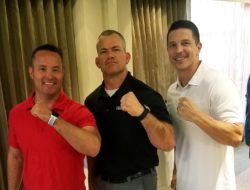Building Freedom through Discipline
Monday, July 2nd
Over the years, as we have worked to build retirement plans with our clients, we have helped people from all different backgrounds and professions. One of the most surprising things we’ve learned as financial advisors, is that creating a sufficient retirement nest egg rarely ever depends on income levels.
We have clients from all walks of life, from teachers to brain surgeons, from engineers to administrative assistants, from mechanics to CEOs. What we see over and over again, is that it is not the amount of income they earn that allows people to successfully prepare for retirement, but instead the discipline they have to stick to their financial goals.

Damon Roberts and Matt Deaton with Jocko Willink, former U.S. Navy Seal and commander of Task Unit Bruiser.
Damon and I recently had the pleasure of attending some leadership training given by Jocko Willink, a former U.S. Navy SEAL, who became the commander of Task Unit Bruiser―the most decorated Special Operations Unit of the Iraq War. Jocko’s life philosophy is based on discipline. He believes that the freedom to do what you want in your life, comes down to how disciplined you are.
While it might seem like discipline and freedom are opposites, Jocko points out that they are intrinsically and fundamentally connected. Everybody wants freedom. People want to do what they want, when and how they want to do it. But the only way to achieve true freedom is through daily personal discipline. If you want the freedom to move, you practice discipline in your eating and physical activity. If you want the freedom to achieve your professional goals, you exercise discipline in how you spend your time. Personal discipline is necessary in any area of your life in which you want more freedom.
Of course this applies to our finances as well. To have financial freedom in retirement, you have to have financial discipline long before retirement begins. This is easy to say but difficult to execute because there is an endless list of short-term financial needs and wants constantly vying for our dollars. And those immediate needs always scream much louder than our long-term retirement goals, far off in the future.
In order to be successful at achieving your long-standing retirement goals, you need a strategy. Jocko Willink shared this analogy from his days as a Navy SEAL. He explained that in combat situations you could never be complacent. But vigilance was problematic too. If you had a target in your sights, and solely focused your eyes only on it, the target would become blurry. Instead, the SEALs focused on the front side of the rifle, something very close (short-term). This way things didn’t get out of focus but they could still keep careful tabs on their target.
As we apply this concept to your financial goals, if you are only focused on the long-term goal of retirement, things can get blurry. Your end goal is years away with untold detours and adjustments along the way. It can start to feel overwhelming and fuzzy; as you lose focus, you become complacent and vulnerable.
You need a short-term concentration. The long-term goal is still there, just like the SEALs’ target, but to keep yourself from losing focus, set short-term goals that you can see directly in front of you.
In other words, what can you get done today? What can you do today or this week or this month that will help you reach your goals? Can you reduce some fees, or convert part of your 401k to a tax-free vehicle? Can you save a little extra, or make a plan to improve your income efficiency, or gather all your documents and statements into one place? Small, short-range objectives can help you when the future goal is starting to blur.
In the same vein, for many of you, your short-term goals also include earning money and diligently saving. This daily, weekly work can become a grind. You can forget why you’re doing it in the first place. When this happens, shift the spotlight back to the long-term aim. If you’ve been staring at the front of your rifle for so long you’ve forgotten why you’re out there in the first place, look back at the original target. Remember what you’re working towards.
Perspective is critical to successful retirement planning and execution. Use the tools of both long and short-term points of view to reinforce your personal discipline and make the progress you want.
As we celebrate our many freedoms this month and remember all those, like Jocko Willink, who have sacrificed so much so that we could have them, keep in the mind the connection between freedom and personal discipline. We enjoy the freedom we do today because someone―many someones―had the discipline and fortitude to fight for what was right.
I hope you will also take the opportunity to examine how much freedom you want in retirement. What will your short-term actions be towards that long-term goal? And then discipline yourself to be able to get exactly what you want.
